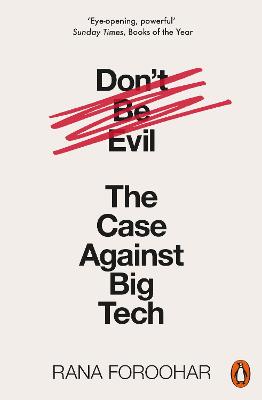Reviewed by Briana @ Pages Unbound on
I think many people have some vague idea that there are issues with big tech companies: they purposely create their products to be addicting, they’re avoiding paying taxes and getting special economic perks, they’re tracking us and selling our data, they use their power to put smaller companies and any potential competitors out of business so they can maintain their market power. However, many of us also write these problems off as not so bad or as a worthwhile trade-off in exchange for using the convenience (and low or free prices) of the products.
Don’t Be Evil demonstrates on page after page exactly how deep and far-ranging these problems are, in ways that will be eye-opening for many readers. Personally, I was struck by how many academics are paid for their research by Google and other companies (there are several stories about conferences where the papers and presentations were all pro-Google and their techniques…because every single scholar there was being funded by the tech giant) and by exactly how much power Big Tech has in lobbying and over our government. If there’s an issue that could affect these companies, they are spending lots of money to influence politicians; the book even sheds some light on how Big Tech became involved in the net neutrality debate and how they convinced people it was good for individuals…and neglected to point out how it was good for Big Tech. There’s also the worrying anecdote of Big Tech lobbying against laws that would reduce human trafficking facilitated by the Internet because they worried about a slippery slope where they might responsible for the use of their own websites. These are issues that affect everyone, but Big Tech is making sure they come out the winners, and many of us don’t even know about it.
The tone of the book, which is unapologetically anti-Big Tech and their insistence on having separate rules from everyone else, could put some readers off. That is, it’s explicitly a book about problems with Big Tech, and there’s no illusion of some “neutral” middle-ground here, but I hope people will look past that and realize that the author has a point. Actually a lot of points.
What readers can do about it is something of an open-ended problem, however. You can attempt to opt out, but the book points out how this is difficult because of how big the companies are and how many people use them. For instance, because of the sheer number of people who shop on Amazon, if you sell things…you need to sell them on Amazon, too. If you want to be on social media at all, you’re probably going to be on a network owned by Facebook or Twitter…because there’s no point joining a social media platform no one else is on. The author’s major suggestions for change, then, tend toward federal policies, and while we can all lobby for what we think is right, the question remains as to whether we can out-lobby Big Tech and its money.
Reading updates
- Started reading
- 8 January, 2020: Finished reading
- 8 January, 2020: Reviewed
